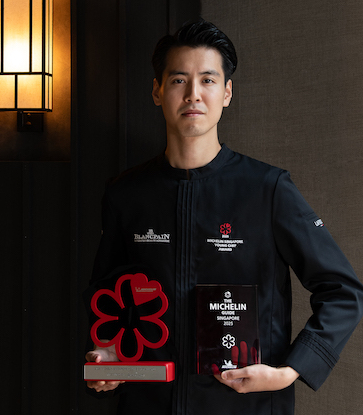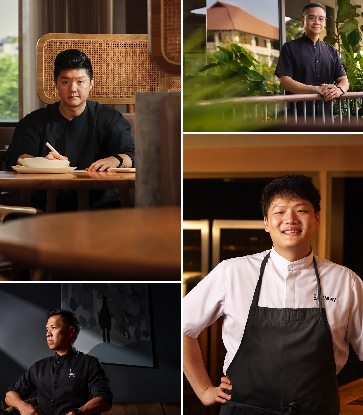Bringing a slice of modern Jerusalem-style food to London is The Palomar, which was recognised with a Bib Gourmand in The MICHELIN Guide Great Britain and Ireland 2019. Over the past four years, The Palomar in the hip SoHo district has been attracting droves of diners for its enticing dishes centred around essential ingredients such as cured lemons, tahini, harissa, sumac and ambah among others.

Elad was in Singapore recently for a six-day kitchen takeover at brunch restaurant Wild Honey in Mandarin Gallery. During the dining sessions, Elad brought over bestsellers at The Palomar, such as the Shakshukit — his riff on shakshuka, a baked egg, tomatoes and peppers dish.

Israeli cuisine is a melting pot of influences from southern Spain, North Africa and the Levant regions. Elad also presented boureka, a Middle-Eastern open-faced puff pastry loaded with eggplant and feta cheese, and musakhan, a Palestinian dish of chicken and sirloin with hummus, sumac-scented onions and chickpeas.
MICHELIN Guide Digital catches up with Elad, who dishes out more titbits about Israeli food and why the cuisine is having its day in the sun.

What is Israeli cuisine?
There has been much discussion on this but I always set two conditions: The chef has to be Israeli and one must have a mix of street smarts and courage to inject his or her style into the cuisine. In Israel, people come from more than 70 countries so we mix and fuse the food traditions and influences from Palestine, Lebanon, Syria and the Mediterranean region.
What are some of the key flavours that define Israeli cuisine?
There is a lot of sourness from the use of lemons and spiciness from harissa. I also use lots of herbs such as coriander and parsley. There are a lot of smoky grilled flavours as we have a strong barbecue culture. Grilling kebabs and eggplant in barbecue pits in the parks is a popular pastime in Israel.
What makes Israeli cuisine stand out from others in the same region?
There are slight differences among shared dishes such as hummus and tahini. We make falafel from chickpeas, while other versions use lentils. Israeli cuisine is more experimental and flexible, and you can taste the influences from around the world. Our cuisine works around bending the rules and dishes turn out differently from what people might have learnt from their grandmothers.
Cooking is like art — artists like to put their mark and own twist in their dishes. I’ve put in Japanese influences such as sake and mirin in tahini instead of water and lemon in my restaurant in Germany. It also helps that Israeli cuisine is healthy and not too heavy, which makes it more popular recently.

There is a funny story behind this dish. My restaurant partner was inspired by his time in the Israeli army and wanted to make a tasty version of loof. It is a canned minced ham and beef ration that tastes horrible as most of the mix consists of flour. I also put in lots of herbs and spices as I was inspired by the aroma of spices in The Shuk market in Jerusalem. This dish even got the stamp of approval from chef Alain Ducasse, who requested for a second helping after trying the dish. That was a “wow” moment for me.
What is your favourite Israeli dish?
I like chreime, a spicy stew that is made with lots of chilli powder and olive oil. I pan-fry or grill the mussels, shrimps and fish to cook the ingredients with chillies, garlic, pepper and fresh herbs. One way of gauging how much a person has enjoyed the dish is to see how stained one’s shirt has become after eating the dish.
















